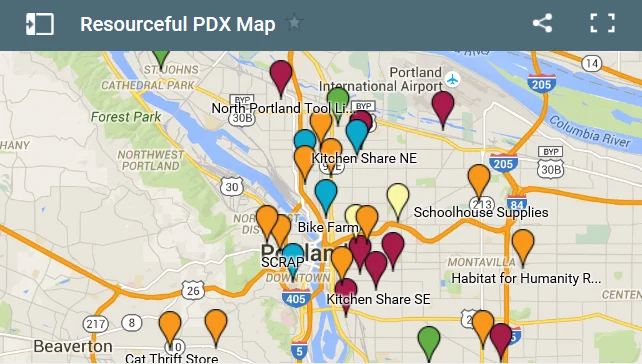Compiled by Eco-School Network Leaders at the Center for Earth Leadership
The time of year between July 4 and September 15 represents a season (other than summer!): Back-to-School. When retailers are emphasizing a shopping season, resourceful people take notice and consider their actions to avoid impulse purchases.
On average, a family with school-aged kids will spend $673.57 for clothes, accessories, electronics, shoes and school supplies. The National Retail Federation surveyed more than 6,800 consumers about their annual back-to-school plans, finding that families with children in grades K-12 are expected to spend 9.6 percent more this year than last year. (Source: Time)
The average spending per family in each category breaks down as follows:
- Clothing: $235.39
- Electronics: $204.06
- Shoes: $126.35
- School Supplies: $107.76
Here are some strategies to help you save money, buy less stuff and get the most from this back-to-school season.
Avoid using shopping lists unless supplied directly by the school
Online and store-supplied shopping lists are often written by the companies who manufacture school supplies. Obtain the school’s supply list to ensure you get what the teacher needs.
Set your school up with Schoolhouse Supplies
Schoolhouse Supplies is a local organization that collects corporate donated supplies, buys supplies in bulk and delivers the school supplies directly to the school. These supplies are less expensive because they are purchased or donated in large quantities. They save parents the hassle of running all over town in the family car to purchase supplies and ensure that the right supplies are bought for the class. Schoolhouse Supplies offers teachers low- or no-cost classroom supplies. Learn more at the how to donate page online.
Buy supplies after winter break
Instead of purchasing supplies at the beginning of the calendar year, work with your teacher and volunteer to purchase supplies after winter break. At some schools, the supplies often run out at mid-year. By replenishing just the most-used supplies, you’ll help ensure that those supplies that have run out will be replaced and the classroom won’t have excess supplies they don’t need.
Volunteer to conduct a supply audit for your students’ classroom
Auditing how many supplies are used versus what supplies are purchased is a valuable activity for teachers. Often, supply lists are generated at the beginning of a teacher’s career and as technology and teaching needs change, the supply doesn’t receive the fine tuning necessary to keep it relevant.
Create a Party Pack for your teacher
Most classrooms have several parties or celebrations annually, in addition to student birthday treats. Creating a Party Pack that contains durable items can significantly reduce the amount of garbage produced by classroom parties. While parties differ, the average event produces 30 gallons of garbage (per Portland Eco-School Network research). That fills approximately one large black garbage bag.
Contact the Center for Earth Leadership for more information about the Eco-School Network.






